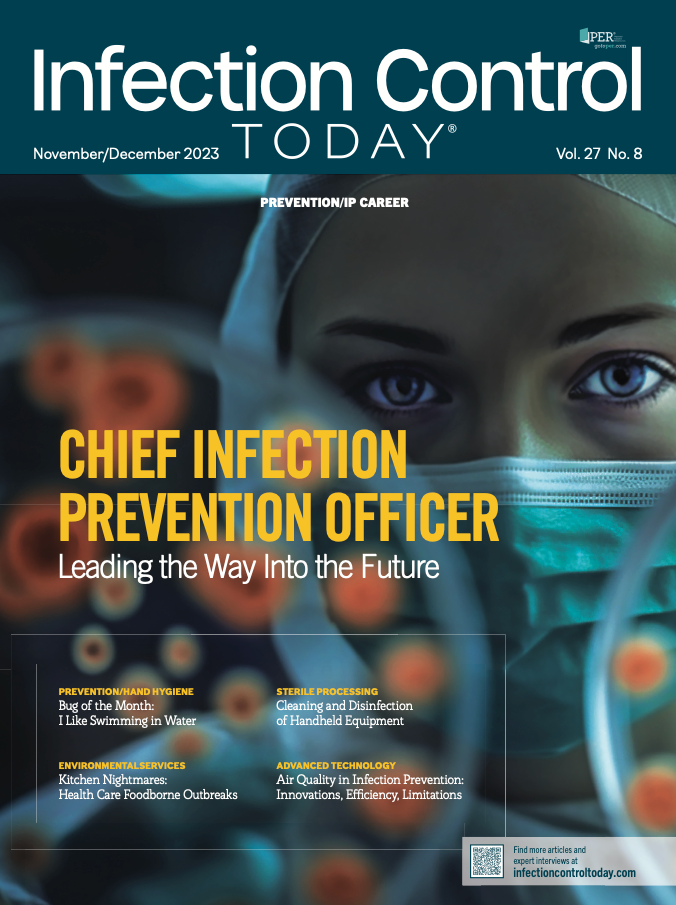Universal Decolonization Prevents Infection/Hospitalization According to Study's Results
A study of 28 nursing homes and nearly 29,000 residents reveals that universal decolonization significantly lowered infection-related hospitalizations, offering hope for improved healthcare outcomes.
Senior patient of nursing home moving with walking frame and nurse support
(Adobe Stock 429992527 by InsideCreativeHouse)

Nursing home residents face a substantial risk of infection and hospitalization, primarily due to the presence of multidrug-resistant organisms. Nevertheless, a recent study offers a ray of hope in mitigating this pressing concern. The research reveals that nursing homes employing a technique termed "universal decolonization," involving a bathing regimen that employs readily available antiseptic solutions to cleanse the skin and nasal passages, have successfully averted severe infections and significantly reduced the prevalence of antibiotic-resistant organisms within their facilities.
The study, “Decolonization in Nursing Homes to Prevent Infection and Hospitalization,” was published in The New England Journal of Medicine.
Data were collected from 28 nursing homes, encompassing a total of 28,956 residents. In the routine-care group, transfers to a hospital during the baseline period were attributed to infection in 62.2% of cases (with this being the mean across all facilities). This infection-related transfer percentage increased slightly to 62.6% during the intervention period. The risk ratio between these 2 periods was essentially 1.00, with a 95% confidence interval (CI) spanning from 0.96 to 1.04.
Conversely, the decolonization group exhibited a more pronounced shift. In this group, 62.9% of transfers to a hospital during the baseline period were due to infection, but this percentage significantly decreased to 52.2% during the intervention period. The risk ratio for this shift was notably reduced to 0.83, with a 95% CI ranging from 0.79 to 0.88. Comparing the decolonization group with routine care, the difference in risk ratio was 16.6% (with a 95% CI between 11.0 and 21.8), and this difference was statistically significant (P < .001).
Examining the discharges from nursing homes in the routine-care group transfers to a hospital for any reason accounted for 36.6% during the baseline period and slightly increased to 39.2% during the intervention period. The risk ratio between these 2 periods was 1.08, with a 95% CI spanning from 1.04 to 1.12.
In the decolonization group, the corresponding figures were 35.5% during the baseline period and 32.4% during the intervention period. The risk ratio for this shift was 0.92, with a 95% CI ranging from 0.88 to 0.96. When comparing the decolonization group with routine care, the difference in risk ratio was 14.6%, with a 95% CI between 9.7 and 19.2.
The number needed to treat (NNT) was calculated to be 9.7 to prevent 1 infection-related hospitalization and 8.9 to prevent 1 hospitalization for any reason.
The study's findings contribute to a growing body of research that underscores the effectiveness of universal decolonization in preventing infections within at-risk populations within the health care system.

Newsletter
Stay prepared and protected with Infection Control Today's newsletter, delivering essential updates, best practices, and expert insights for infection preventionists.
Reducing Hidden Risks: Why Sharps Injuries Still Go Unreported
July 18th 2025Despite being a well-known occupational hazard, sharps injuries continue to occur in health care facilities and are often underreported, underestimated, and inadequately addressed. A recent interview with sharps safety advocate Amanda Heitman, BSN, RN, CNOR, a perioperative educational consultant, reveals why change is overdue and what new tools and guidance can help.
New Study Explores Oral Vancomycin to Prevent C difficile Recurrence, But Questions Remain
July 17th 2025A new clinical trial explores the use of low-dose oral vancomycin to prevent Clostridioides difficile recurrence in high-risk patients taking antibiotics. While the data suggest a possible benefit, the findings stop short of statistical significance and raise red flags about vancomycin-resistant Enterococcus (VRE), underscoring the delicate balance between prevention and antimicrobial stewardship.
What Lies Beneath: Why Borescopes Are Essential for Verifying Surgical Instrument Cleanliness
July 16th 2025Despite their smooth, polished exteriors, surgical instruments often harbor dangerous contaminants deep inside their lumens. At the HSPA25 and APIC25 conferences, Cori L. Ofstead, MSPH, and her colleagues revealed why borescopes are an indispensable tool for sterile processing teams, offering the only reliable way to verify internal cleanliness and improve sterile processing effectiveness to prevent patient harm.
The Next Frontier in Infection Control: AI-Driven Operating Rooms
Published: July 15th 2025 | Updated: July 15th 2025Discover how AI-powered sensors, smart surveillance, and advanced analytics are revolutionizing infection prevention in the OR. Herman DeBoard, PhD, discusses how these technologies safeguard sterile fields, reduce SSIs, and help hospitals balance operational efficiency with patient safety.
Targeting Uncertainty: Why Pregnancy May Be the Best Time to Build Vaccine Confidence
July 15th 2025New national survey data reveal high uncertainty among pregnant individuals—especially first-time parents—about vaccinating their future children, underscoring the value of proactive engagement to strengthen infection prevention.